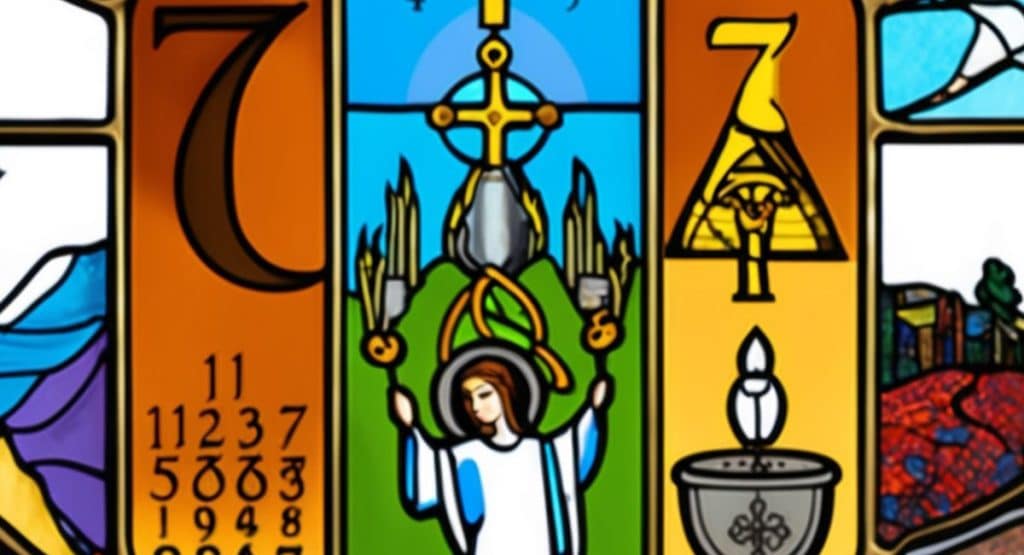Biblical Numerology: Unlocking the Hidden Meaning of Numbers in the Bible
Have you ever wondered why certain numbers and patterns appear throughout the Bible? There’s a reason for that.
These numerical references seem to hold a deeper significance beyond the literal. This is where biblical numerology comes into play – the study of the symbolic and mystical meanings behind the numbers woven into Scripture.
Delving into biblical numerology can be an enlightening experience, allowing readers to uncover the layers of meaning behind the numerical patterns and symbolic use of numbers. By understanding this ancient practice, one can gain a richer understanding of God’s self-revelation and the interconnected nature of the biblical narrative.
Whether you’re a Bible scholar or simply curious, the study of biblical numerology has the power to deepen your spiritual understanding. Join us as we unlock the secrets that numbers hold within the pages of the Good Book.
What is Biblical Numerology and Why is it Important?
Biblical numerology is the study of the symbolic and mystical meanings of numbers as they appear throughout the Bible. This discipline has its roots in the ancient world, where numbers were believed to hold profound spiritual significance. In the Judeo-Christian tradition, the use of numbers in Scripture was not seen as arbitrary, but rather as a deliberate means of imbuing the text with layers of meaning beyond the literal.
The significance of numbers throughout the Bible
Numbers feature extensively in the Bible, from the seven days of creation to the twelve tribes of Israel. These numerical references are not mere coincidences; they carry important symbolic weight and convey deeper spiritual truths. For example, the number three is often associated with the Holy Trinity, while seven represents completeness and God’s perfect plan. The number twelve denotes the wholeness of God’s people, as seen in the twelve apostles and the twelve tribes.
How Biblical numerology enhances Bible study and interpretation
By studying the numerical patterns and symbolism in the Bible, readers can gain a richer understanding of God’s self-revelation and the interconnectedness of the biblical narrative. Exploring the layers of meaning behind the numbers used in Scripture allows for a more nuanced and insightful interpretation, revealing the intentionality and design woven throughout the Good Book.
What Are the Most Significant Numbers in the Bible?
Certain numbers and numerical patterns appear with striking frequency throughout the biblical text, suggesting that these figures hold profound symbolic and spiritual significance. By examining the meaning and usage of these key numbers, we can uncover powerful insights into the nature of God, the structure of His creation, the divine messages from angels, and the themes that permeate the Scriptures.
Some of the most significant numbers found in the Bible and their symbolic meanings include:
- Number 3: Representing the Holy Trinity and themes of divine completeness and resurrection. The number three is often associated with the Father, Son, and Holy Spirit, as well as Jesus’ three days in the tomb before his resurrection.
- Number 7: Denoting God’s perfect plan, completeness, and the fulfillment of His work. This number is seen in the seven days of creation, the seven feasts of Israel, and the seven churches addressed in the book of Revelation.
- Number 12: Symbolizing the wholeness and totality of God’s people, as evident in the twelve tribes of Israel and the twelve apostles chosen by Jesus. This number highlights the unity and completeness of the community of believers.
- Number 40: Associated with a period of testing, trial, or preparation, as seen in the Israelites’ 40-year wandering in the wilderness and Jesus’ 40 days of fasting in the desert.
- Number 666: Known as the “number of the beast” in the book of Revelation, this number carries deep symbolic meaning related to human imperfection and the forces of evil.
The consistent appearance of these and other numbers in the Bible points to their profound symbolic and theological importance. By understanding the meaning and significance behind these numerical references, we can deepen our appreciation for the inspired nature of the Scriptures and the intricate design that permeates God’s self-revelation.
The symbolic meaning of number 3: Trinity and resurrection
The number three holds a place of particular importance in the Bible, often associated with the Holy Trinity and the theme of resurrection. The triune nature of the Godhead – Father, Son, and Holy Spirit – is a central tenet of the Christian faith, and the number three is used to represent this divine completeness. Additionally, Jesus’ three days in the tomb before his resurrection underscores the significance of this numerical pattern.
Number 7 in the Bible: Completeness and perfection
Throughout the Scriptures, the number seven is imbued with a sense of spiritual significance, denoting God’s perfect plan and the completion of His work. This is evident in the seven days of creation, the seven feasts of Israel, and the seven churches addressed in the book of Revelation. The recurrence of this number suggests a divine order and the fulfillment of God’s purposes.
The importance of 12: Tribes of Israel and Apostles
The number twelve is another biblically significant figure, often representing the wholeness and totality of God’s people. This is most clearly seen in the twelve tribes of Israel and the twelve apostles chosen by Jesus. These numerical patterns highlight the unity and completeness of God’s chosen community, both in the Old and New Testaments.
How Does the Bible Use Numbers to Convey Deeper Meanings?
Beyond the prominent numbers that hold symbolic significance, the Bible also utilizes numerical references in more nuanced ways to imbue the text with deeper layers of meaning.
By examining how numbers are employed in prophecies, patterns, and teachings, we can gain a richer understanding of the intentionality behind the biblical authors’ use of these powerful figures.
Numbers in prophecies and visions
Numerical references in biblical prophecies and apocalyptic visions often carry profound symbolic meaning that extends beyond the literal. A prime example is the “number of the beast” – 666 – mentioned in the Book of Revelation.
This enigmatic figure has been the subject of intense scholarly debate, with many interpreting it as a symbolic representation of human imperfection or the forces of evil. By understanding the significance of this numerical pattern, readers can uncover deeper insights into the prophetic warnings and spiritual truths woven into the text.
Numerical patterns in Biblical texts
The Bible is replete with numerical patterns that reveal the interconnectedness and intentionality of the Scriptures. For instance, the recurrence of sets of seven or fourteen in various passages suggests a divine order and structure to the text.
These repetitive numerical motifs not only add to the poetic and literary qualities of the Bible but also point to the overarching themes and narratives that unite the collection of sacred writings.
The use of numbers in parables and teachings
Jesus often employed numerical references in his parables and teachings to convey deeper spiritual truths. For example, in the parable of the lost sheep, the detail that the shepherd leaves the ninety-nine to search for the one lost sheep is not merely functional but rather a symbolic representation of God’s relentless love and care for the individual.
By understanding the significance of the numbers used in these teachings, readers can gain a more nuanced appreciation for the messages Jesus sought to impart.
By closely examining how numbers are utilized throughout the Bible, from prophecies and visions to parables and patterns, we can uncover a wealth of meaning and insight that extends far beyond the surface-level understanding of these numerical references. This deeper exploration of biblical numerology can enrich our spiritual journey and deepen our connection to the divine.
What is the Significance of 40 in Biblical Narratives?
The number 40 holds a particular significance in the Bible, often associated with periods of testing, trial, or preparation. By examining the various instances where this number appears, we can uncover deeper insights into the divine purposes and the spiritual journeys of key biblical figures.
Moses and the Israelites: 40 years in the wilderness
One of the most prominent examples of the number 40 in Scripture is found in the story of Moses and the Israelites. After their exodus from Egypt, the people were tasked with wandering in the wilderness for 40 years before entering the Promised Land. This period represents a significant testing and purification process, as the Israelites were challenged to trust in God’s provision and obey His commands.
Jesus’ 40 days of fasting and temptation
The pattern of 40 is also seen in the life of Jesus, who spent 40 days and 40 nights fasting in the wilderness, where he was tempted by the devil. This period of solitude and spiritual examination mirrored the Israelites’ 40-year journey, highlighting the importance of preparation, discipline, and reliance on God before embarking on one’s divine mission.
Other instances of 40 in the Bible and their meanings
The number 40 appears in numerous other biblical narratives, each time carrying a symbolic significance. For example, the great flood during Noah’s time lasted for 40 days and nights, while many of the prophets and kings, such as Moses, David, and Elijah, were 40 years old when they began their important work. In these instances, the number 40 represents a time of transition, transformation, and the fulfillment of God’s purposes.
By exploring the consistent use of the number 40 in the Bible, readers can gain a deeper appreciation for the intentionality behind these numerical references and the overarching themes of spiritual growth, obedience, and divine providence that permeate the Scriptures.
Embracing Biblical Numerology
From the symbolic meanings of key figures like three, seven, and twelve, to the deeper layers of numerical patterns – the Bible is imbued with an intricate design that points to God’s sovereignty.
By studying these numerical insights, we can gain a richer understanding of God’s self-revelation. The details woven throughout have the power to deepen our faith and provide guidance for our own lives.
Are you ready to unlock the hidden meanings of numbers? The numerology experts at Keen.com are here to help. Connect with a gifted numerologist who can shed light on the symbolic importance of the numbers influencing your path.












